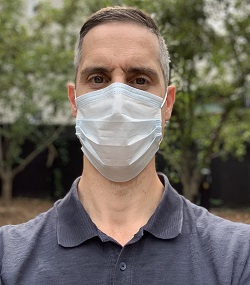Telepsychiatry at CHA Bridges the Divide

Staff child and adolescent psychiatrist Nicholas Carson, MD, explores CHA’s adoption of telepsychiatry to care for patients during COVID-19.
“Before the pandemic, we really didn't have telehealth capacity where we were providing care to kids and adults through video,” said Dr. Carson. Often, telehealth is delivered to rural communities by providers at clinics in cities far away. “At CHA, we launched a telepsychiatry program in five days thanks to the herculean efforts of providers, administrative staff, and our performance improvement team,” said Dr. Carson.
At CHA, telehealth is now delivered by Google Meets and CHA was the first hospital in the country to link Google Meets with MyCHArt, CHA’s online patient portal. NEJM Catalyst published a quality improvement article authored by staff at CHA that highlights the rise of telepsychiatry rapidly using Lean tools.
Helping patients adapt to the new system required education, outreach, and new systems design. Frontdesk staff at CHA called each patient to help them understand how to use telepsychiatry and assess their technology capabilities at home. Hundreds of calls were made to patients over the course of a few days to get the ball rolling. “The administrative staff in Psychiatry are the real heroes and made it possible for providers to connect with families in the safety of their homes,” said Dr. Carson.
Language access barriers also had to be overcome with the move to telepsychiatry as CHA serves one of the most diverse patient populations in Massachusetts. Many CHA patients are limited in English and receive care in Haitian-Creole, Spanish and Portuguese. “CHA’s multilingual interpreter services translated materials in different languages and joined calls with families to help them with the new system and troubleshoot any problems,” said Dr. Carson. “We met each family where they were in terms of technology and language access to deliver care at an unprecedented moment,” said Dr. Carson.
Dr. Carson joined CHA in 2004 where he completed a fellowship in child adolescent psychiatry. Soon after, he spent time as a research fellow with the CHA Center for Multicultural Mental Health Research. Dr. Carson was associate training director of the Child and Adolescent Psychiatry Fellowship Program and is currently the medical director of Child and Adolescent Outpatient Psychiatry Services at CHA. He is a staff child and adolescent psychiatrist and assistant professor of psychiatry at Harvard Medical School.
Social Isolation During COVID-19
The pandemic has led to increased social isolation across the spectrum but some of the hardest hit have been kids and teenagers. “I work with families who have not let their kids out of the house for months at a time, except to get food at the corner store, out of fear of COVID-19,” said Dr. Carson. “Kids need social connections in order to develop at a young age and feel connected to a broader community.”
As children across the country head back to school, virtual learning will present new challenges and added stress to families. “At CHA, we have been able to maintain therapeutic relationships through video and even start new relationships,” said Dr. Carson. “These connections provide a vital lifeline and reassure patients that our whole continuum of care still exists.”
CHA’s school-based clinics in Cambridge, Somerville and Everett, have providers embedded who offer evaluations, psychotherapy and medication treatment for high school students. “We are building collaboration in these school districts to help identify younger kids and connect them to care,” said Dr. Carson.
“Recently, I conducted an evaluation of a child living with family members over the phone and it was hard to get a clear sense of how safe he was,” said Dr. Carson. It turned out that several members of the family had lost their jobs and they were struggling to put food on the table. Dr. Cason and his team connected the family to Project Bread to link them with food resources and other community support. The next week a video call was set up with the family and Dr. Carson was able to engage with the entire house with the help of a CHA medical interpreter.
“We had a much clearer sense of the constellation of people caring for this child and seeing them through video made the interaction smoother,” said Dr. Carson. There were several generations of family members all living in the same home who were stepping up to care for the child. Video calls provide a window into people’s lives that were not possible with in-person visits at a clinic. Being able to step into someone’s home virtually is an added bonus of telepsychiatry according to Dr. Carson.
It’s Safe to Get Care at CHA
“CHA’s primary care teams have been adjusting to COVID-19 since early March in a really beautiful way to provide support to families,” said Dr. Carson. Many appointments at CHA are now by video or phone. This includes video visits using Google Meet.
If you have a new or ongoing health concern, don't wait. Just call or send CHA a MyChart message. We can help decide if a video, phone, or in-person visit is right for you. We continue to gradually reopen for face-to-face visits, starting with the most pressing needs. If you are coming in person, please know we are working hard to keep you safe
Disclaimer
This articles provide general information for educational purposes only. The information provided in this article, or through linkages to other sites, is not a substitute for medical or professional care, and you should not use the information in place of a visit, call consultation or the advice of your physician or other healthcare provider.